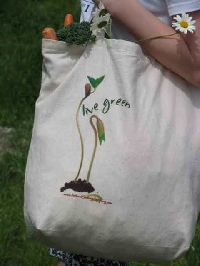
Understanding exactly what is eco friendly shopping can help change the world!
Every moment of every day, as a consumer and participant in modern day society, you make decisions which have a profound effect on the world around you. Businesses everywhere respond to what YOU demand, and are constantly tailoring their products to your preferences. Realizing this fact, and making conscious decisions to purchase products which have a positive impact on the natural world, translates into eco-friendly shopping.
There is a growing movement in the world in which smart shoppers are waking up to the very real power they possess within their wallets–the power to support honest companies over shady ones, and eco-responsible products over their environmentally destructive counterparts. While this is definitely a positive, be careful you don?t fall for business?s less forthcoming response to the new niche market, commonly known as ?greenwashing.? Marketers smell a trend like sharks smell blood, and will do anything to get at all those potential dollars, even to the point of lying and cheating to exploit your good conscience.
This is when it is very important, in the war to drive corporations to be honest and responsible, to do your research. First, learn the buzz words. Terms like organic, fair trade, sustainable, carbon neutral, and natural have different weights and meaning in the world of eco-friendly marketing. Don?t just take their word for it. For example, if a product is purported to be made with ?all natural materials,? it does not mean that the fibers used were grown organically or harvested by people who earn a living wage.
For example, ?all natural,? but conventional (not certified organic) cotton, is one of the dirtiest and most environmentally devastating crops in the world. It uses more pesticides than any other single crop worldwide, causing damage to environment, wildlife, and farm workers everywhere. The words you want to look for when shopping for textiles of any kind, be they natural clothing, rugs, or furniture, are ?certified organic,? because this label is federally regulated, and ?fair trade,? because this indicates the workers who harvested and made your item were treated fairly, worked in healthy conditions, and were paid a living wage for their labors.
~
Some companies take production a step further and utilize alternative energy sources and take other steps to offset their energy usage. The goal here is to come as close as possible ?carbon neutral? in their business operations. Any company that makes this worthy claim is worth checking into. And, if they are worth their solar panels, they will be totally transparent in their practices. This is when the worldwide web is your friend. Go to the company?s website and find out how they claim to achieve carbon neutrality. And then, dig deeper by googling the company to see what others are saying about them. Green watch groups are pretty vigilant when it comes to corporations claiming green piety, so if they smell a rat, they?ll let you know.
You can make decisions for a more sustainable world with every purchase you make, from groceries to gift giving. Just remember to keep it simple, and make purchases wisely. Avoid impulse buys which result owning in more stuff than you can ever really use (most of this ends up in a landfill).
Choose foods with a low environmental impact, like local organic produce and pastured meats. Buy gifts made from recycled or reclaimed materials, or handmade items made from unbleached, organic fibers. Opt for items with the least possible packaging, and recycle whatever packaging you can. Pay attention to the miles your potential new toaster or t-shirt had to travel to get to you. Avoid plastic whenever possible. More durable (and less ?disposable?) glass or metal versions of just about anything are almost always better than fossil fuel based plastics which clog up our oceans and never degrade.
And, as always, bring your own bag. Reusable shopping bags should be your constant companions for any buying excursion.
Follow these few simple rules and do your research, and you will be well on your way toward saving the world every time you shop!
References:
Scientific American: What is Greenwashing
Windows to the Universe: What is Carbon Neutral

